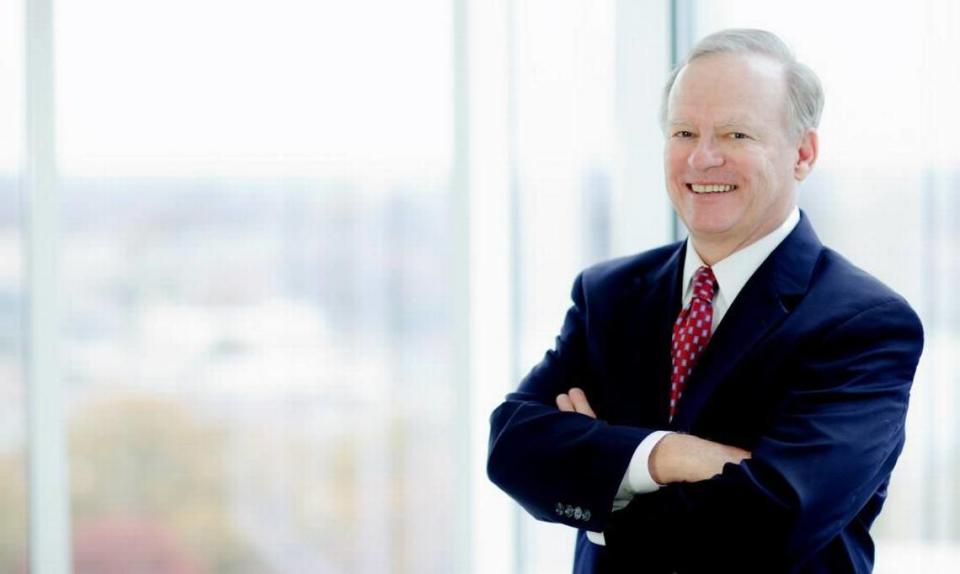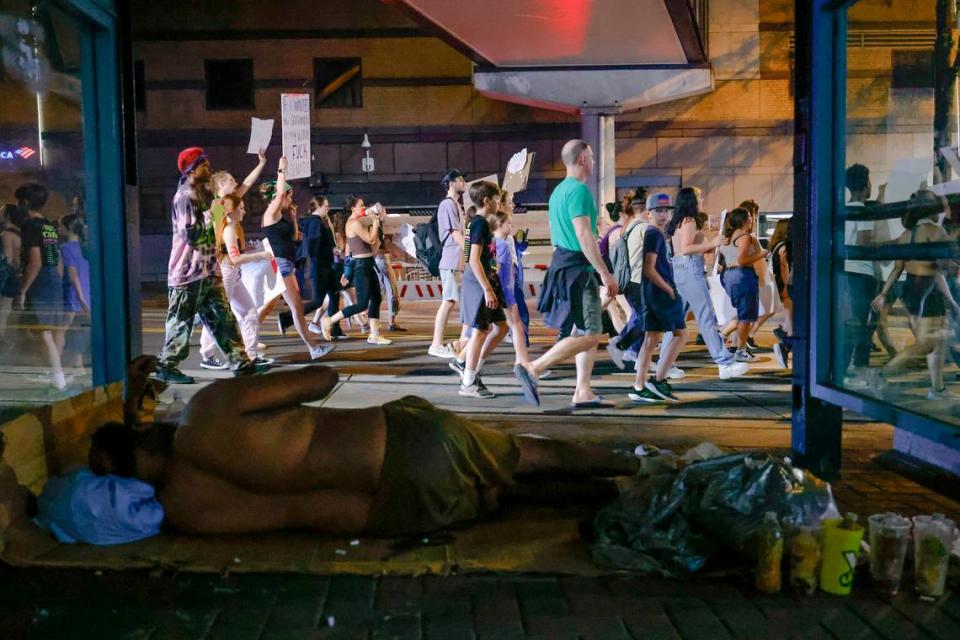CLT Politics: ‘Stunning gap’ in Americans’ trust, former NC Supreme Court justice says
- Oops!Something went wrong.Please try again later.
Welcome to the inaugural email edition of CLT Politics, a new weekly analysis of political news and events in Charlotte and the region, published Thursday by The Charlotte Observer.
I’m Will Wright, the Observer’s political reporter. I joined the Observer in June 2021 after working as a reporting fellow at The New York Times and as the eastern Kentucky reporter for the Lexington Herald-Leader. Email me at wwright@charlotteobserver.com with story ideas, suggestions and feedback. I’m excited to learn more about politics in Charlotte and North Carolina with your help.

We’ll start this newsletter with some not-so-happy and not-so-surprising news. Polling results released by Gallup this week show Americans’ confidence in some of our nation’s most important institutions — Congress, the Supreme Court, newspapers, the police and organized religion — has declined to its lowest point in decades.
Gallup has conducted this poll every year since 1993, and less regularly going back to 1973. The new numbers represent the lowest overall confidence level in major American institutions since the polling started.
The decline is apparent across all partisan groups.
To help make sense of it — are these numbers as concerning as they seem; what are some of the major contributing factors; and, most importantly, what can we do about it — I called Bob Orr.
As a former insider, the former N.C. Supreme Court justice has unique insights into the power of institutions and how much public opinion affects that power. Our conversation was edited for length and clarity.

A conversation with Bob Orr
Wright: What’s the most surprising thing about the results?
Orr: I think what stood out was the consistency in the drop in confidence in all of these institutions from this year to last year. That is disturbing and distressing in a variety of ways. It’s not like it was just one or two institutions, it was across the board.
Wright: I wondered about that, at what point do people lose faith in specific institutions and when do they lose faith in the system as a whole?
Orr: Well, in looking at this range of institutions, these are pretty predictable. You expect the political institutions as perhaps the most vulnerable to a sway in public opinion. It’s not surprising to see institutions like small business and the military having substantially more confidence. The difference between the military, at 64% confidence, and Congress with 7% confidence — that’s a stunning gap.
The only institution that didn’t drop in confidence was organized labor, and maybe that’s because they’re so much out of public life.
Wright: You’re particularly qualified to talk about the decline in confidence in the Supreme Court. Tell me about what it means to have a country lose faith in its highest court.
Orr: It has staggering implications. We have looked to the judiciary and the U.S. Supreme Court as a somewhat neutral arbiter on these major constitutional and statutory issues. We all understand the partisan divide from a Congressional and Presidential perspective. What we’re seeing more now is the court is perceived through that same partisan lens.
The question is, are decisions in the courts being made in the historic perspective of the judiciary, or have we now crossed the Rubicon? Are the decisions results-oriented, and the majority rules how it wants to and then scrabbles together a legal and Constitutional rationale to justify it?
We see this in North Carolina right now with the Leandro controversy (when five school districts sued the state over educational opportunity being provided to students in low-income counties and won). One of the really disheartening things is to see lawmakers say, “We don’t care what the court says. We’re not gonna do it.” Democracy cannot survive with that mindset.
Look at Brown vs. Board of Education. There was a degree of resistance in the South to not integrate schools. But ultimately, after the courts pronounced that ‘separate but equal’ was unconstitutional, the states and the localities complied. What would have happened if they didn’t? That’s where the institutional confidence in the Supreme Court is critical.

Wright: What else stood out to you about these results that might be less obvious?
Orr: What is sort of distressing to me is looking at the top three institutions in which people have the greatest confidence. One is the military and one is the police.
In a time in our history where many folks are worried about authoritarianism creeping into our democracy, that sort of confidence in the forces of power as opposed to the elected officials is a little troubling.
Wright: That’s interesting. The strong arm of government — which can protect you or put you in jail or both — that’s the part of government people most trust.
Orr: Yeah. And that’s no reflection on the fine men and women serving in the military today. But still, it mirrors a mindset of the American public toward authority — toward that type of authority rather than elected authority.
Wright: This is my least favorite question, but I have to talk about newspapers. Confidence in newspapers dropped from 21% in 2021 to 16% in 2022. How do you think about the impact of this, and what lessons should journalists glean from it?
Orr: Let’s throw in television news, too. Historically, papers did tend to align with one side or the other. Then, there was a period where “professional journalism” kicked in and they tried to not be viewed as an arm of either party. More recently we’ve seen the decline of print papers. When I was growing up, the first thing you did in the morning was grab a cup of coffee and go grab the paper. That’s not the case anymore.
In television and electronic media, there’s a blurring of who’s a reporter and who’s a commentator. That plays into people’s reduction in confidence as well. Television news was the next-to-lowest institution on the list, out of 16.
Wright: OK, how do we turn this around, and how do people stay rightfully angry about some things without becoming totally disillusioned with the institutions that keep our country a country?
Orr: The leadership in these institutions need to be talking with the broader public about this. I confess, I’ve said on numerous occasions that I’m losing faith in the institutions of our country. That’s disturbing, because one of two things happens when somebody says that. You either disengage, which we don’t want people to do, or people want to do something violent or aggressive to demonstrate my frustration.
They’ll say, “I’m gonna go to the school board meeting and I’m gonna scream and rant at those five people standing up there because I’m mad about mask mandates or critical race theory or whatever.” Those are the two extremes, and I think leadership — national leadership, the business community, churches, our candidates — need to have a conversation with the broader public about trying to at least shore up faith in the system.
That conversation needs to be had.
Highlights from Gallup polling
The three institutions with the highest level of confidence were small businesses, the military and the police, at 68%, 64% and 45% respectively.
The bottom three were big business, television news and Congress, at 14%, 11% and 7% respectively.
The biggest single-year declines from 2021 to 2022 were in the presidency (15% decline) and the U.S. Supreme Court (11% decline).
Here’s what I’m reading from outside North Carolina
From Robin Wright at the New Yorker: The West Débuts a New Strategy to Confront a Historic “Inflection Point”
From Danny Hakin at The New York Times: 7 Trump Allies Subpoenaed in Georgia Criminal Investigation
From Stuart A. Thompson at The New York Times: On Conservative Radio, Misleading Message Is Clear: ‘Democrats Cheat’
Here’s what I’m reading in North Carolina
Photos by Alex Slitz of The Charlotte Observer: U.S. Oath & Naturalization Ceremony in Charlotte
From Arabella Saunders for The Assembly: Death Notice: When a person incarcerated in a North Carolina state prison dies, families often struggle to find even basic information about what happened.
From Evan Santiago of The Charlotte Observer: Her family’s home has stood 180 years — even her million-dollar bid can’t save it

